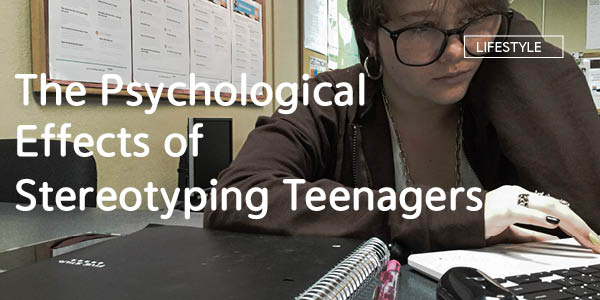The Psychological Effects of Stereotyping

Alandra Doran ponders on why stereotyping is so proactive within our society.
Stereotyping often harms teenagers’ well-being from both the inside and out.
Adolescents, as a whole, are often categorized as daring and insensitive without anyone actually looking into why teens act the way teens do. This age classification of ‘teenage hood’ often determines how a person will move forward or if one takes a couple steps backwards, but for teenagers what decides this in the long run? Stereotyping causes adolescents to feel pressured to “obey” the titles people put upon teenagers.
Teenagers are stereotyped onto the broad spectrum of rebellions. Kids grow up being told that when they leave the boat of childhood and jump into the cool water of knowledge they’ll “revolt” against one’s previous standings. Children are told that teenagers misuse substances, act irresponsible and rebellious which can lead kids to think teenagers are bad and irresponsible. Kids who grew up constantly being told about how bad teenagers are often leads them to fall into that category when one’s mind is on the edge. “I think kids think being a teenager is way more fun and freedom then it actually is, I couldn’t wait to be a teen when I was younger, but being a teen is way harder than I thought,” Stella Haag, a freshman, spoke. Alike with Haags thoughts, Robert Newsom, a senior said, “Well, kids are easily influenced and so are teenagers but the effect teens have in kids is very bad because the kids see everything the teens are doing and mimic that.” Kids who realize that adolescents are that age where people will learn realistic responsibility choices and schedule management will often grow up similarly and less likely to go around with that careless attitude some teenagers display..
Another aspect of stereotyping in adolescents is gender discrimination which causes a person to feel trapped in a monotonous box. In society, men are told to be tough, emotionless and hotheaded whereas women are told to be soft, gentle and overly sentimental when in truth people are not stuck in these tiny categories of “gender” but accepted as who one is as a person. Gender stereotyping causes teens to feel suffocated by what people say a person must act like based on unimportant ideals, often teens feel trapped between doing what one wants and what the world wants. Robert Newsom again spoke on gender stereotyping, “I’d say all it does is cause issues internally and should just be ignored.” This sort of stereotyping causes people permanent damage beyond one’s teenage years, it doesn’t go away with the flick of a switch, it stays with someone till the person accepts one selves.
In conclusion, stereotyping teenagers causes damage and agitation leading to a sour few years when one is meant to be building relationships and personal ideals.

What is your favorite color?
Deep greens.
What is your worst personality trait?
“Your worst personality trait is that you don’t like comedies,”...





